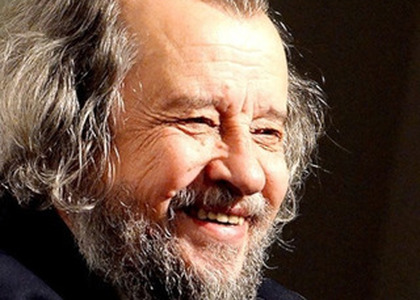> [Archived] Interviews

Interview with composer Sabin Păutza
The Radio music season continues tomorrow with a concert by the Radio Chamber Orchestra, in which the work "Ludus modalis III" by Sabin Păutza will be performed for the first time in Romania. On this occasion, the renowned author gives us more details:
Mr Sabin Păutza, on Wednesday 29 November, the Radio Chamber Orchestra will give a concert under the baton of Georghe Costin, and on this occasion, the Romanian public will be able to hear for the first time your work entitled "Ludus modalis III". To begin with, could you tell us what inspired you to write it and how the ludic spirit is reflected in your creation?
First of all, it is related to the fact that 75-80 years ago, a great German composer, Paul Hindemith, wrote a work entitled "Ludus tonalis" and I remember that I was a professor at the Iasi Conservatory more than 50 years ago and I was teaching this work to my students. That's where I got the idea to write a work Ludus modalis, because it is known that in the musical world there are two main systems in which music can be written, modal and tonal, and so, if Hindemith wrote Ludus tonalis, why shouldn't I write Ludus modalis and that's how the work was born. She is 18-19 years old at least. It was originally written for string quartet for the Voces Quartet in Iasi, for which I wrote several works. After that it was reorchestrated for string orchestra, which means Ludus modalis II, and Ludus modalis III, as it is now called, was made for chamber orchestra, in which there are also wind players and percussion. The work has never been performed in this form in Romania, so it will be a first performance in our country, but it has been performed in Holland, London, Canada and the United States. It is the same music re-recorded for different ensembles. We haven't changed a note from the original version which is for string quartet. It is based exclusively on modal systems and you can imagine that Romanian music since its existence has been based on certain modal systems of its own. This work is very Romanian, because it could not be otherwise, if it is based on the sound material that we discover in our songs, in bocete, in doina, in ballads and so on.
How is the artistic collaboration with Gheorghe Costin going for the work Ludus modalis IIIull?
Our collaboration goes back decades, to when Gheorghe Costin was a promising young man. Now he is a mature conductor with an exceptional career behind him.
How are you looking forward to this concert at the Sala Radio?
You can imagine that I'm going out of my way to be there, because unfortunately, in recent years, with these pandemics, I have missed a lot of concerts and there have even been some important concerts that I couldn't attend. I had my Recviem played in Iasi, I couldn't go. First of all because it was postponed, because I couldn't do it and someone else did it, but I couldn't even be present at the concert, because I had big health problems with these pandemics. I'm coming to Bucharest for this concert at the Radio, and then I'm going to Targu Mures the next day, where I'm playing half a concert. The choir of the Târgu Mureș Philharmonic will sing me through my choral works this time and I said that if I'm going to do this, it's definitely worth being in Târgu Mureș.
Translated by Bianca-Daniela Penaru,
University of Bucharest, Faculty of Foreign Languages and Literatures, MTTLC, year I
Corrected by Silvia Petrescu














